兰桂花园室内改造-陪伴两代人的家(组图)
日期:2022-07-20 07:54:00 来源:木伏建筑研究所 点击次数:1
本案是对杭州兰桂花园小区的一间跃层住宅的改造,中国商品房从上世纪末以来经历了20多年爆炸式的发展,兰桂花园作为早期杭州商品房住宅的之一也见证着这段历史。如今随着时间的推移,尽管房屋此前经历了多次维护、改造,但原有布局结构较为局促已无法满足新时代的居住需求,改造势在必行。
This project is the renovation of a duplex flat at Langui Garden Community in Hangzhou, China. China's commercial housing has experienced more than 20 years of explosive development since the end of last century. Langui Garden, as one of the early commercial housing projects in Hangzhou, also bears witness to this history. Nowadays, with the passage of time, although the flat has undergone many times of maintenance and refurbishment, the original layout structure is relatively cramped and can no longer meet the living needs of the new era, so renovation is imperative.
委托人是屋主女儿,从小与父母在此居住,如今女儿在婚后旅居英国,小夫妻偶尔回杭小住。两代人,意味着两种审美和价值观的碰撞,但同时这个住宅承载了一家人最初成长相伴的美好岁月。如何在保留原有住宅印记的同时关照两代人不同的居住需求,是我们此次项目中考量最多之处。
We were commissioned by the hostess’s daughter, who lived here with her parents in her childhood. She has now got married and settled in the UK, and the young couple occasionally returns to Hangzhou to stay. Two generations mean the collision of two aesthetics and values, but at the same time, this flat bears the beautiful years when the family lived together. How to accommodate the different living needs of the two generations while preserving the original imprint of the flat is the most important consideration in our project.

▲ 小区现状图
Photos of the Community
打破住宅格局,重建秩序
Break the Residential Pattern and Rebuild the Order
人们生活习惯的改变也使得居住空间的使用方式发生了变换,需要对空间秩序进行重建,此次设计我们遵循“实用、开放”的原则对空间进行了改造。在一层空间中,进门玄关处我们移动了原始墙体的位置,使玄关面积更为紧凑, 同时增加了墙另一面厨房的面积。原本的封闭式厨房改为开放式,与餐厅产生更好的互动关系,成为了主人款待来访客人的一个重要空间。在这里吃饭、聊天、喝茶、赏景。流线型的旋转楼梯与厨房的自由形地坪交相呼应, 为整个空间增加了自然与灵动之感。楼梯方向的改变,改善了餐厅原本局促的空间。
The change of people's living habits also transforms the way of using living spaces, which requires reconstructing the spatial order. In this design, we follow the principle of "Practicality and Openness" to renovate the space. On the first floor, we modified the position of the partition to make the hallway compact and meanwhile increase the area of the kitchen on the other side. The open kitchen is connected to the dining room, being an interactive and enjoyable space for the hosts to entertain visitors, where they can eat, chat, drink tea, and enjoy the scenery. The wave-shaped spiral staircase echoes the free form on the floor of the kitchen, adding a natural and agile sense to the entire space. The direction change of the staircase improves the quality of the originally cramped dining space.
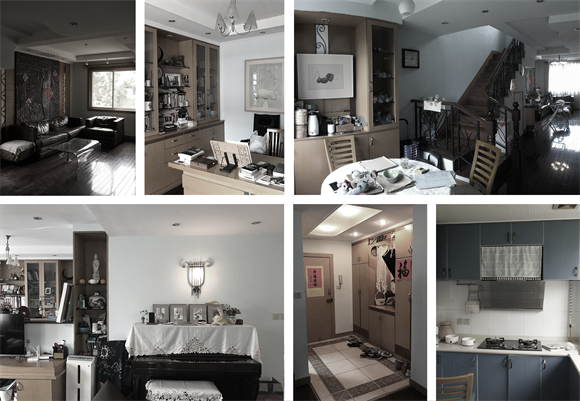
▲ 一层房屋改造前样貌
Appearance of the First Floor before Renovation
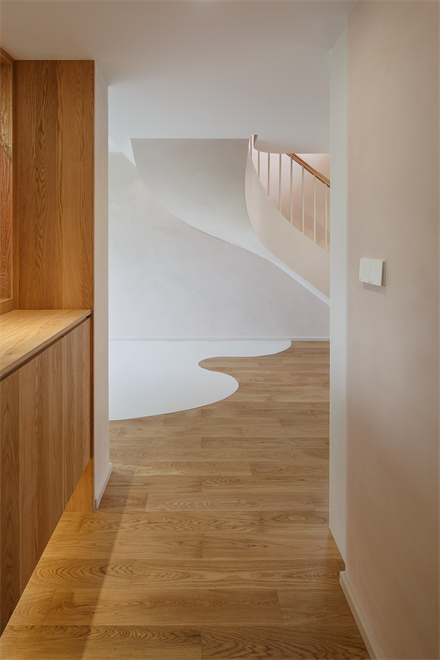
▲ 门厅
Hallway
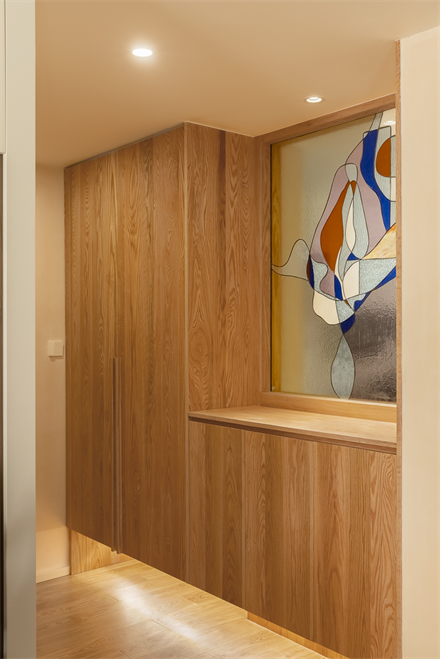
▲ 门厅
Hallway
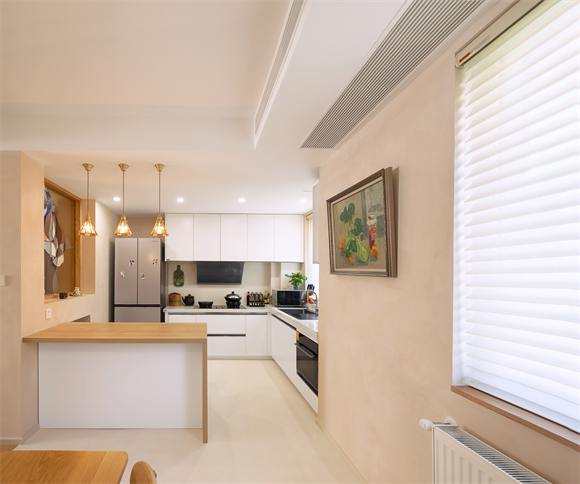
▲ 开放式厨房
Open Kitchen
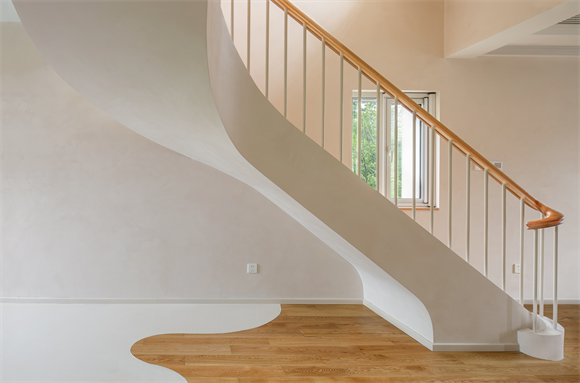
▲ 楼梯
Stairs
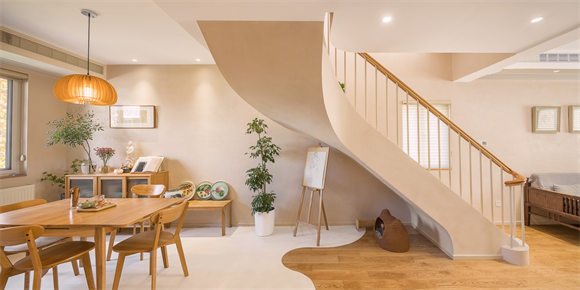
▲ 餐厅与楼梯的关系
Relationship between the Dining Room and the Staircase
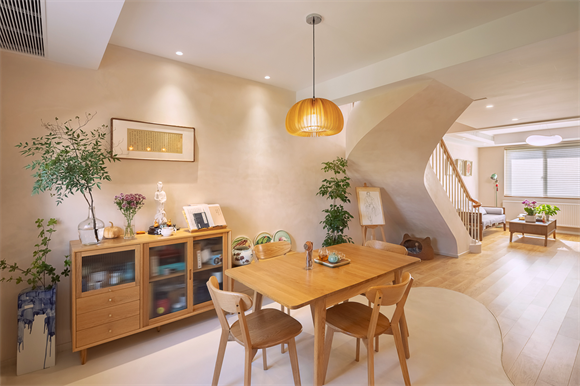

▲ 餐厅
Dining Room

▲ 从餐厅看向客厅
Looking at the Living Room from the Dining Room
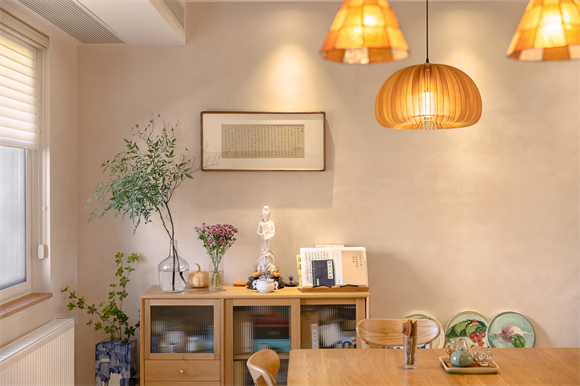
▲ 餐厅一角
A Corner of the Dining Room
在书房空间的处理上,原先敞开的书房被封闭起来作为了卧室,这样做能够置换原本二层的卧室功能,为二层女儿的“套房空间”提供可能性。卧室进口我们做了推拉门设计,并利用房屋的结构空隙处做为储物收纳柜,在解决房屋死角的同时对空间加以运用。
The open study is now changed into a bedroom. This compensates for the loss of a bedroom function on the second floor and provides the possibility of “suite space” for the daughter on that floor. At the entrance of this bedroom, we’ve designed a sliding door; transforming the structural gap into a storage cabinet, this design solves the dead corner by making full use of the space.
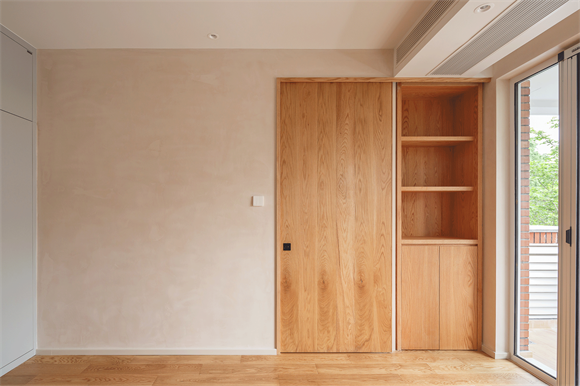
▲ 移门与储物收纳柜
Sliding Door and Storage Cabinet
书房的书柜功能,如今被放置于电视背景墙,与客厅融为一体。钢琴仍摆放在客厅,与旧宅的摆放位置重叠,让使用者仍留有原来的空间记忆。
The bookshelf is combined with the TV background wall for television and is integrated with the living room. The piano is still settled at its original place, evoking memories.
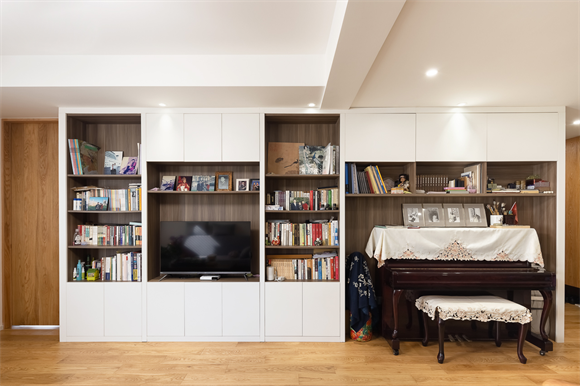
▲ 电视背景墙
TV Background Wall
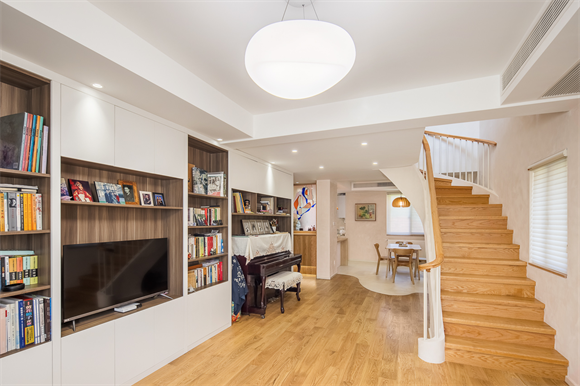
▲ 从客厅看向餐厅
Looking at the Dining Room from the Dining Room
在二层空间的处理上,当我们敲开天花板时,发现一个两米多高的屋顶空间,通常这些看起来不起眼的建筑结构会被装饰天花吊顶所遮蔽,但我们认为它可以呈现出住宅顶楼独特的原始建筑特质,因此在设计时我们保留、展示了部分的屋顶空间及坡屋顶形式。
On the second floor, when uncovering the decorative ceiling, we found a hidden roof space about two metres high. Such inconspicuous structures, which are usually covered by the decorative ceiling, indeed can be exposed to present the unique spatial characteristic of the top floor. So we selectively maintain and present some of the roof space and sloping-roof shape.
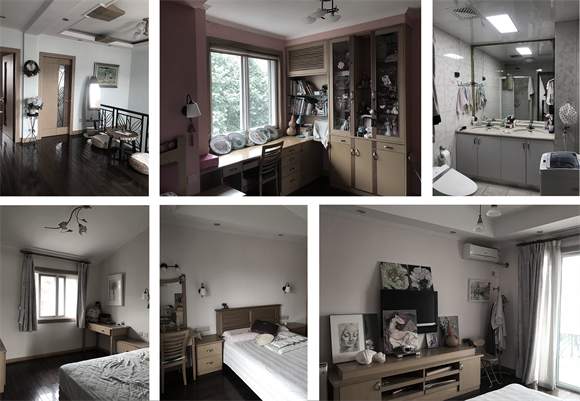
▲ 二层房屋改造前样貌
Appearance of the Second Floor before Renovation
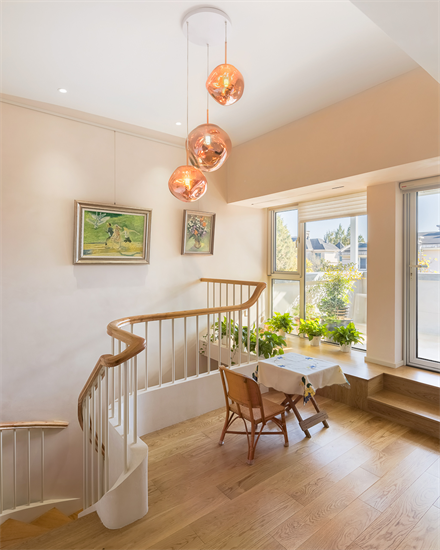
▲ 二层休息处
Leisure Area on the Second Floor

▲ 原有屋顶空间的揭示
Presentation of the Existing Roof Space
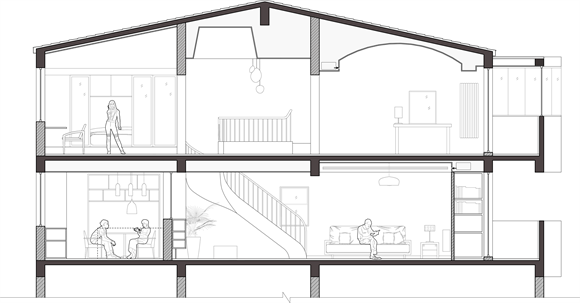
▲ 剖立面图
Sectional Elevation
二层北面为女儿和女婿的房间,设计将原来的女儿房间与卧室打通,变成了他们的卧室与起居室(套房),这是一个他们专属的生活空间,流淌的卫生间地坪也与一层的空间设计相互呼应,体现年轻一代的风格偏好。主卧我们设计了拱形的天花顶,以便形成对称的空间感让主人感觉更舒适,主卧的设计配上女主人的家具摆设,形成了复古与当代之间的风格流动。
The north rooms on the top floor are for the daughter and her husband. The design connects the original daughter’s room with the guest room, making these spaces the young couple’s new bedroom and living room (suite). They are special and exclusive living spaces for the young couple. The flowing floor pattern and the stained-glass window of the bathroom echo the spatial design of the entry floor, reflecting the style preference of the younger generation. An arched ceiling is designed for the master bedroom to form a symmetrical space and make the hosts more comfortable. Our design of the master bedroom and the hostess's furnishings together form an interaction between retro and contemporary styles.
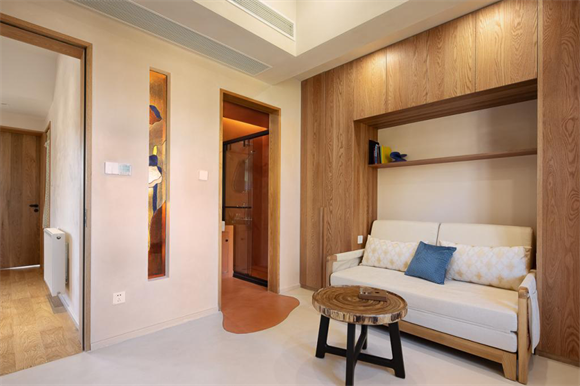
▲ 女儿夫妇起居室
Young Couple’s Living Room

▲ 女儿夫妇起居室
Young Couple’s Living Room
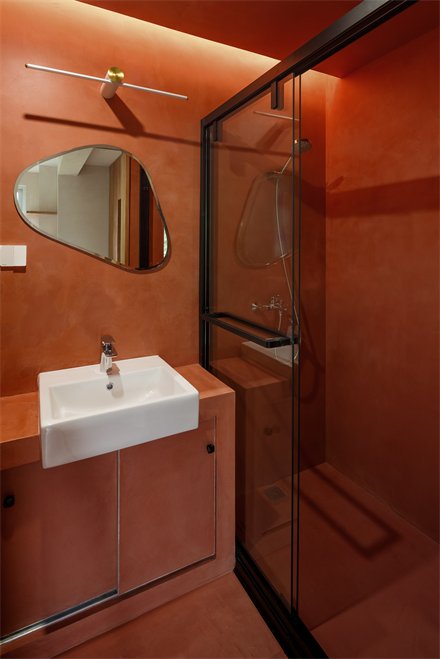
▲ 女儿夫妇卫生间
Young Couple’s Bathroom
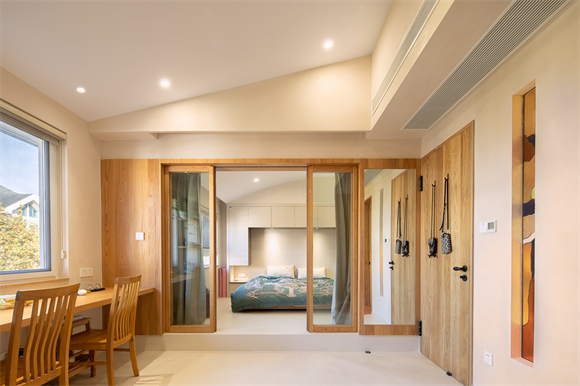
▲ 女儿夫妇起居室与卧室间的灵活隔断
Flexible Partition between the Young Couple’s Living Room and Bedroom
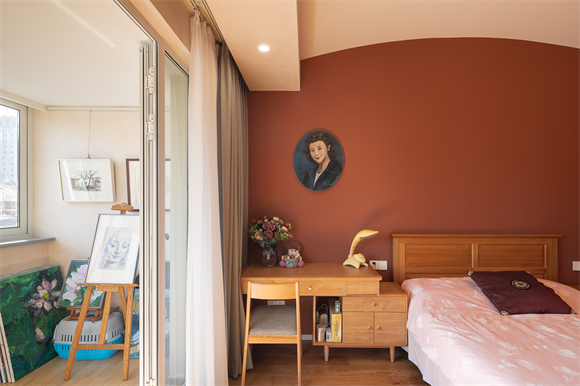
▲ 主卧
Master Bedroom
利用传统材料,保留记忆
Use Traditional Materials to Preserve Memories
彩玻璃是一个已经被大家几乎遗忘的比较复古的材料,早前常用于西方教堂、清真寺和其他宗教建筑的窗户上,其后渐渐融入当地日常建筑和室内之中。屋主女儿平时旅居英国,在与其沟通后,我们决定在设计中加入彩色玻璃的元素。屋主女儿黄任菲毕业于伦敦艺术大学和皇家艺术学院织物设计专业,因此彩玻璃的设计制作由她与鲁迅美术学院玻璃艺术专业的何辉老师合作完成,将不同文化传统元素带入的同时与老宅气质相融合。
Stained glass is relatively retro material that has been almost forgotten. It was first used in the windows of western churches, mosques and other religious buildings, and then was gradually incorporated into local common architecture and interior. After communicating with the daughter, who lives in the UK, we decided to include stained glass in the design. The daughter, Huang Renfei, graduated from Textile Design from University of the Arts London and Royal College of Art. The design and making of the stained glass is done collaboratively by the daughter Huang Renfei and glass artist He Hui, who teaches in the major of Glass Art at LuXun Academy of Fine Arts. The stained glass brings in a traditional element from different cultures and integrates it with the temperament of the old flat.
由于彩色玻璃本身半透明的特性,我们分别在进门玄关以及二楼的卫生间置入了彩玻璃,使得原本相对昏暗的两个地方透亮起来,且玄关作为住宅的主入口,每当回家打开家门的一瞬间就能感受到整个住宅的氛围。
Due to the translucent nature of stained glass, we place this material in the hallway and the second-floor bathroom, making the originally dim areas bright. At the main entrance, people can feel the atmosphere of the whole flat when the door opens.

▲ 玄关彩玻璃
Stained Glass in the Hallway
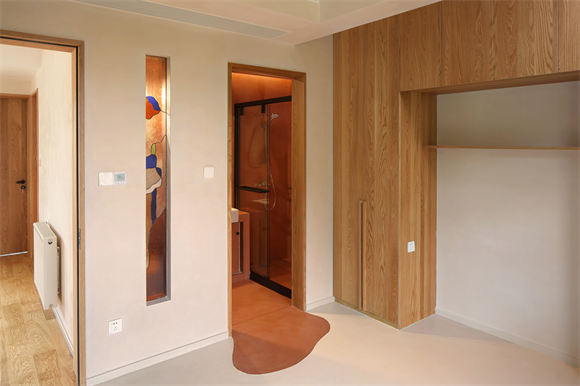
▲ 流淌的卫生间地坪与彩色玻璃
Flowing Floor and Stained Glass of the Bathroom
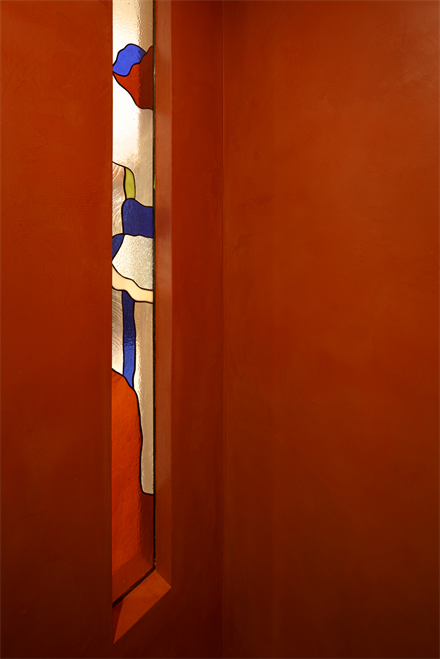
▲ 卫生间彩玻璃
Stained Glass of the Bathroom
结尾
Conclusion
通过这次设计,我们感觉到两代人之间思想的碰撞与摩擦,但又彼此包容,正如地面所呈现的两种材质的混搭,虽然不同却又互相交融,形成了独特的风格,期待这所老宅能够继续承载他们更多的情感记忆。
Through this design, we have felt the collisions of ideas between two generations, but they are tolerant of each other as the floor presents two materials mixed, which are different but blend with each other, forming a unique style. We hope this flat will continue to carry more of their emotions and memories.

▲ 原始平面图
Original Plans
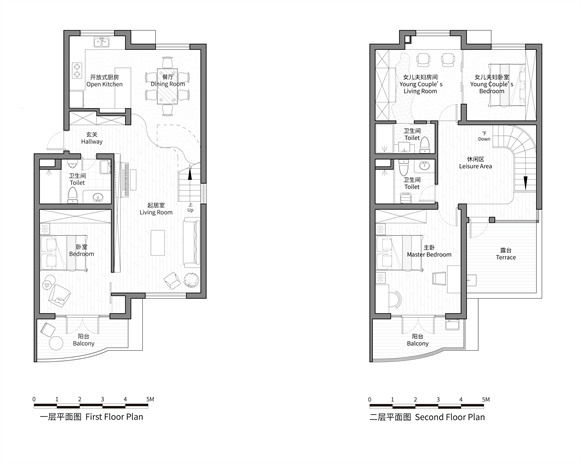
▲ 改造后平面图
Plans after Renovation
项目信息
项目名称:兰桂花园室内改造
项目面积:170㎡
设计单位:木伏建筑研究所 (MUFU Arch-Lab)
联系邮箱:info@mufu-archlab.com
主创设计师:胡臻杭 韩雪
实习生:尹靖文、张琪丽
施工负责:袁自兵
竣工时间:2021年
主要材料:橡木、艺术涂料
品牌:Novacolor、大金、金牌
摄影:孟庆伟、谢亦伦
Project Information
Project Name: Interior Renovation of Langui Garden
Project Area: 170㎡
Design Unit: MUFU Arch-Lab
Contact Email: info@mufu-archlab.com
Chief Designer: Zhenhang Hu and Xue Han
Interns: Jingwen Yin, Qili Zhang
Construction Manager: Zibing Yuan
Year of Completion: 2021
Main Materials: Oak, Art Paint
Brand: Novacolor, Daikin, Goldoem
Photographer: Qingwei Meng and Yilun Xie

公司介绍
木伏建筑研究所MUFU-ARCHLAB是一家跨学科的设计与研究机构。合伙人毕业于建筑联盟学院、伦敦艺术大学、南京大学、重庆大学等知名院校,并执教于中国美术学院、浙江大学、浙江农林大学等高校。建筑师和教师的双重身份促成了我们设计与研究相互依托的工作架构。建筑史和地理学的学术背景让我们极其重视“地域”与“时间”这两个维度。我们的名称“木伏”取自宋《营造法式》所载结构构件“栿”,为系梁之意,旨在“空间”和“时间”的串联整合。我们目前主要从事的领域是剧场与表演空间、室内与展陈、乡村建设(文化建筑、景观建筑、基础设施)。
联系方式:info@mufu-archlab.com
公众号:木伏建筑研究所
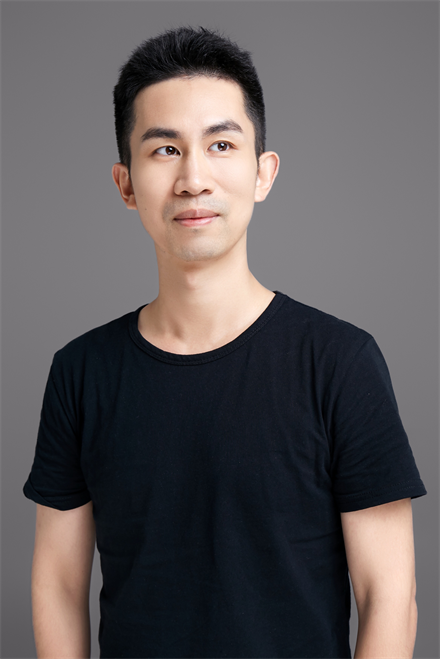
个人简介
胡臻杭,木伏建筑研究所(MUFU-Archlab)主持建筑师、中国美术学院建筑艺术学院讲师、剧场与空间表演研究者。他先后获得东南大学建筑历史与理论硕士、英国建筑联盟建筑学院建筑学硕士学位,并曾于英国中央圣马丁艺术学院进修舞台设计。胡臻杭致力于南宋演剧与剧场史、城市空间与环境戏剧的研究。其曾与德国德绍包豪斯基金会开展“包豪斯舞台”的联合研究,与法国马拉盖建筑学院、美国康奈尔大学、英国伦敦大学学院开展城市空间的联合研究。胡臻杭曾于中国国际设计博物馆和上海艺仓美术馆策展。其剧场作品展演于威尼斯戏剧节、德国德绍包豪斯博物馆“节日总舞台”、德国海勒劳艺术剧院“重现Appia”演出季、英国Cockpit剧院、中国国际设计博物馆开馆展、东方竹——亚洲竹生活艺术展等。其社区营造作品参展“第三届中国设计大展及公共艺术专题展”。其作品获评中华人民共和国文化和旅游部全国美术馆优秀公共教育项目。
(责任编辑:水晶)